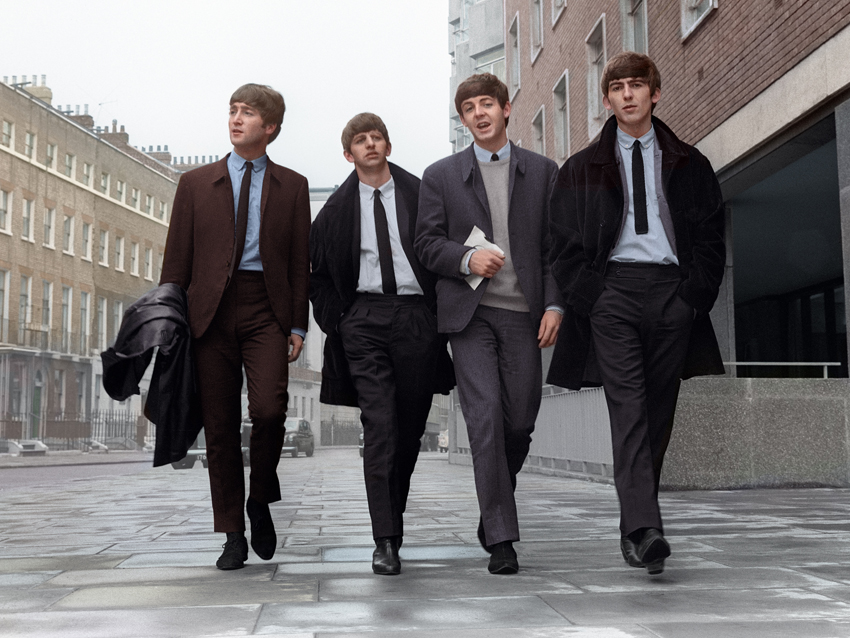
Producers Kevin Howlett, Mike Heatley on the new Beatles Live At The BBC set
On January 10, 1962, BBC head Peter Pilbeam demonstrated that he had at least one tin ear. Writing in Brian Epstein’s BBC audition application concerning a Beatles performance he’d just witnessed, the broadcasting executive assessed the band’s two lead singers thusly: “John Lennon – yes, Paul McCartney – no.”
“At least it had a happy ending,” says Kevin Howlett, producer (along with Mike Heatley and Jeff Jones) of the just-released Beatles set On Air – Live At The BBC Volume 2. “Paul did sing on The Beatles’ first BBC broadcast, so Brian Epstein or somebody must’ve persuaded Peter to give Paul a go.”
He laughs, adding, “But it is one of the great understatements of all time when Peter said in his notes, ‘Not as rocky as most. More country and western, with a tendency to play music.’ I guess some of the other groups that Peter was auditioning didn’t have as varied a sound as The Beatles.”
Between March 1962 and June 1965 – when they weren’t creating a new paradigm for how rock bands would operate, establishing the LP as an art form, making films that laid the groundwork for MTV and doing that whole, you know, taking-over-the-world thing – The Beatles somehow found the time to record 88 different songs (275 performances) for the BBC, with many of their appearances going direct to air.
“They treated those sessions very seriously,” Howlett says. “What’s extraordinary about the recordings is, you can really hear a band hungry and desperate to do anything they could to make it. That meant traveling hundreds of miles through the night to appear at a BBC studio, because the BBC hardly played a record in those days – you had to perform live to get your music out there.”
But what On Air makes abundantly, exquisitely clear – a case that was already soundly made on the previous BBC set from 1994 (now reissued, remastered, with some new goodies) and, if you can find it, the out-of-print 1962 Hamburg Star Club recordings – is that, for a time, before the constant exposure to mass hysteria forced them to quit performing, The Beatles were a live juggernaut.
Focusing largely on 1963, when they still had a head of steam from their sweat-filled nights at the Cavern Club, On Air’s 37 musical performances capture the band turning in tight, punchy, exuberant versions of originals, spanning from Please Please Me to I Feel Fine. In many cases, however, it’s their raw, affectionate, creative covers (McCartney is positively unhinged on Little Richard’s Lucille, while Lennon owns Chuck Berry’s Memphis, Tennessee) that showcase The Beatles at the height of their onstage powers.
Howlett and Heatley sat down with MusicRadar recently to talk about the making of On Air – Live At The BBC Volume 2 and the history of The Beatles as radio performers.
Talk about the evolution of the new BBC set. When did you start to work on it?
Kevin Howlett: “It started in 2011 – that’s when we did some initial work. The idea was to do something with the first album, which hadn’t been on iTunes. We were thinking of what bonus material could work, but I then thought there was enough for a whole new album, ‘cause I was very familiar with the material and had worked with it for many years making radio programs about it.
“Mike and I got together and put together lists of songs that could go on a new album, and then we made sort of a demo of a tracklisting. A first draft went to [Apple Corps CEO] Jeff Jones, Paul and Ringo and Yoko and Olivia. There was some fine-tuning from then on.”
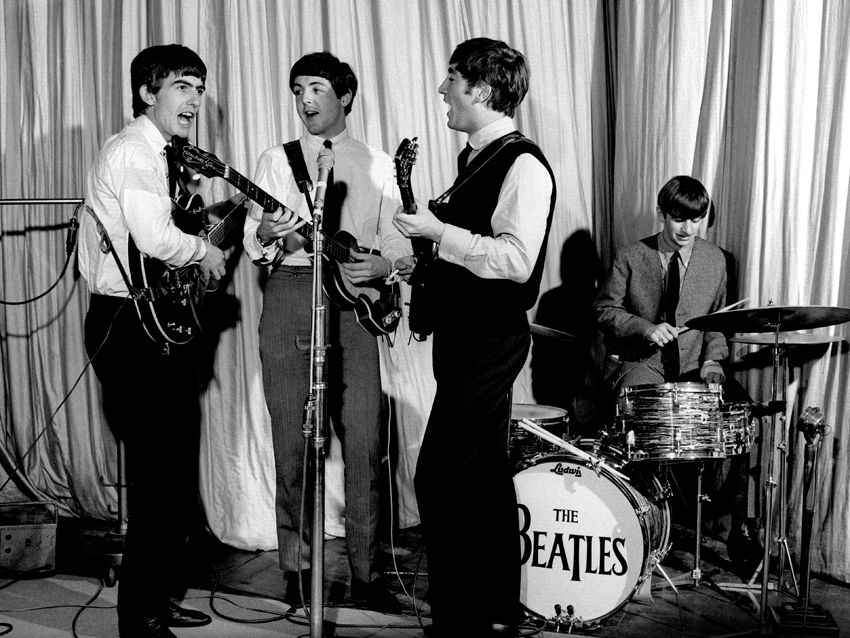
Producers Kevin Howlett, Mike Heatley on the new Beatles Live At The BBC set
Mike Heatley: “We sat down at Abbey Road and went through every conceivable version of every song that we believed should be featured, because although the first album had many unique songs, for the 30 songs that The Beatles hadn’t recorded for EMI, many of the well-known songs they’d recorded for radio, like She Loves You and Twist And Shout, weren’t included. So the first thing to do was to make sure that those were in.”
Howlett: “The two obvious ones on the album are Beautiful Dreamer and I’m Talking About You – they’re the two rarest tracks on Volume 2. It was great to put those on. I also thought it was worthwhile to have alternative versions of the previously unreleased songs that were on the first album. They did Lucille twice, so now you have both versions of that; they were recorded within a few days of each other, but they’re quite different.
“It’s great to have those familiar number one singles and LP tracks, but you’re hearing BBC versions of them. I Saw Her Standing There is such a great version; it can really stand up next to the one that came out on their record. The same with other tracks: I love Money. It doesn’t have piano on it, so it’s just the four of them playing it, and they really play it so well.”
What kind of comments did Paul and Ringo have? I imagine that they hadn’t heard some of these recordings in a long time.
Howlett: “They heard the first version when we put a running order together, and there were two CDs for them to listen to. That’s the first time they were involved. I guess they came to it fresh, and they were pleasantly surprised. I talked to Paul earlier in the year for a radio special that’s going to be broadcast in the States around Thanksgiving weekend, and he talked about the BBC Beatles material quite a bit. As we were talking off the mic, he told me that he listened to this album on a car journey from London to his home in Sussex; he sat back and listened and thought, ‘Ah, this is great!” The energy of it and the spirit – he was really impressed at how proficient the group was.
“Undoubtedly, they were, because a lot of these tracks were either live straight onto the air or live straight onto a mono tape machine. There was some primitive overdubbing for session tracks in late 1963 onwards to 1964; not multi-tracking – it’s basically singing over the top or handclaps over what they’d just recorded.
“Most of it is absolutely live straight to mono. It does show what a wonderful live group they were and how they had the stamina to do so many live recordings in a short space of time in a BBC studio. There were times when they did 18 tracks in a single day, 19 tracks on another day. That makes [the album] Please Please Me look like a walk in a park.”
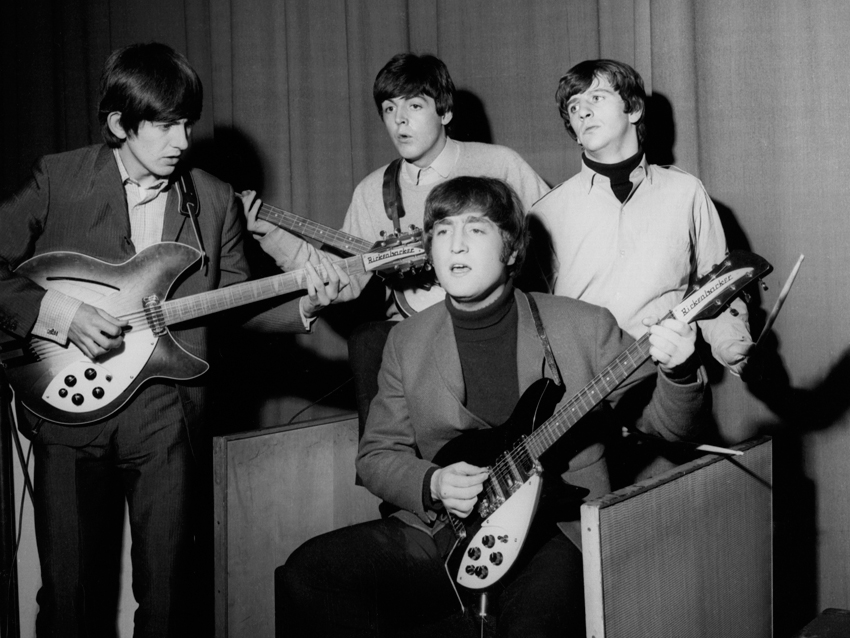
Producers Kevin Howlett, Mike Heatley on the new Beatles Live At The BBC set
Bands nowadays probably couldn’t match that kind of output. I imagine it’s because of the work ethic The Beatles developed during their early years, particularly when they played all of those nights in Hamburg. This probably also gave the band a huge amount of cover material that they had at their disposal.
Howlett: “Yeah, that’s true. But it wasn’t only that – Ringo said that they would go into the studio and experiment. During their lunch hour, they would learn two or three songs and try them out. You can tell that they’re experimenting with pretty current R&B hits. Things like Chains or You Really Got A Hold On Me, these were current hits when they recorded those tunes.
“They were so good at learning songs very quickly and rearranging them for their lineup. Some of the songs they were covering – those American rhythm and blues songs, Motown tunes, hits on Tamla – they were never heard in Britain; they were never on the radio. Even though The Marvelettes’ Please Mr. Postman was an American number one, it was just not heard in Britain. So they were very clever to seek it out and find it, but they also so adept at arranging it for themselves.
“The same goes with the Arthur Alexander tunes they covered – those songs had horns and strings and backing vocalists, and yet they brilliantly worked them out for their four-piece lineup. That gives those songs quite a different feel. The Beatles were so in love with American music. You know, British musicians thought that they could never measure up to American rock ‘n’ roll and rhythm and blues, ‘cause that’s where it all started, and the thought was that it must be the blood and the DNA of the American musicians.”
A lot of times, what they played on those early cuts would bear fruit on their own recordings. Paul’s basslines on Memphis, Tennessee are somewhat reminiscent of his rolling bass parts on Come Together.
Howlett: “Mmm. Yeah, that’s a good point. And you know what? I think, in many cases, the bass is clearer on the BBC recordings, because the engineers didn’t have to worry about the needle jumping off the record, which is why the bass was reduced on those early EMI recordings. The BBC engineers thought that they weren’t making records, but as it turns out they were.” [Laughs]
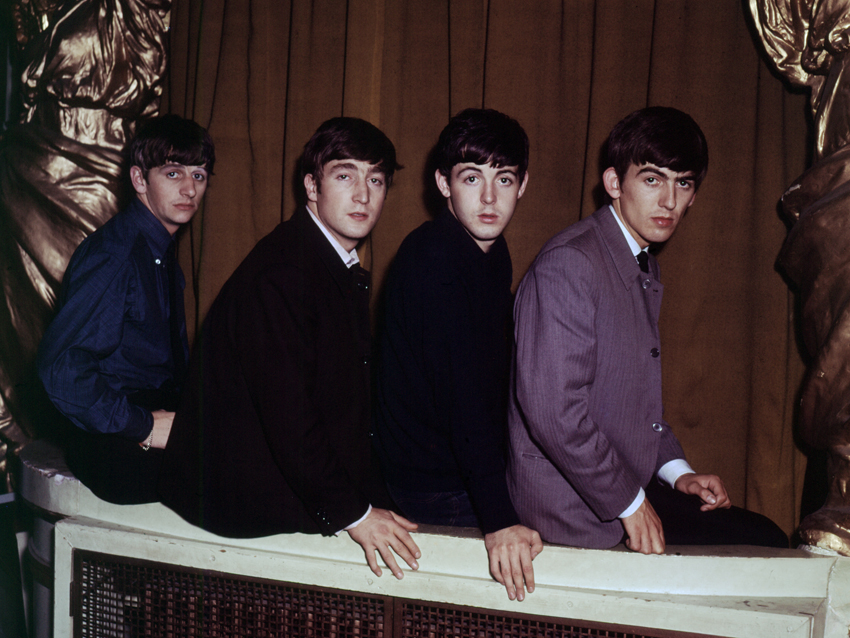
Producers Kevin Howlett, Mike Heatley on the new Beatles Live At The BBC set
In addition to the bass, the BBC recordings are more sympathetic to Ringo’s drums. You hear his nifty little fills on Please Please Me a lot more. And even on a song like Misery, he drives the band with a lot of force.
Howlett: “That’s true. Well, hats off to our remastering engineers, Alex Wharton and Guy Massey, and the audio restoration engineer, Simon Gibson. Because when we talk about versions, Mike and I were very selective about which one was the best to go on the album. For example, there were several versions of Twist And Shout for us to listen to, and that’s a difficult choice because they did that song many times and did it extremely well. But the one we chose, we thought, was the best of available.”
People talk about home taping as a phenomenon that began in the ‘70s, but I’m wondering if Britain saw a rise in reel-to-reel recorder sales as a means of capturing some of The Beatles’ BBC performances.
Heatley: “I got a Fidelity Argyll Minor for my 11th birthday. It was 22 guineas, and it was fantastic. But I’m not sure how much people used to tape the shows, although I imagine that some did. It’s amazing, really, how some of the shows are just not available at all. The first Side By Side broadcast – that doesn’t exist. There were lots of others that exist in bits and pieces, but they’re not in any form that you can actually use.”
From the notes that you were able to locate, do you know if there was a standard mic setup used for The Beatles, particularly on the studio sessions?
Howlett: “Yeah. The thing to bear in mind is that the BBC’s equipment, compared to, for example, Abbey Road Studios, was pretty primitive. They were using the same tape machines, I believe, which were EMI TR90s – there’s a picture in the booklet of those – so they were very good recording machines. But the mixing desks and the mic setups were very different; there were limited numbers of mic channels.
“I go into this in my book [The Beatles: The BBC Archives 1962-1970], in a section called Recording The Beatles. So those sound engineers would come up with ingenious tricks to change the EQ sound on microphones. One studio manager put a cigarette packet on the back of a microphone to change the sound. Because you only had one EQ channel on your desk, so you might use that on the vocals, but to try and change the sound on the other instruments you had to come up with all of these other tricks.”
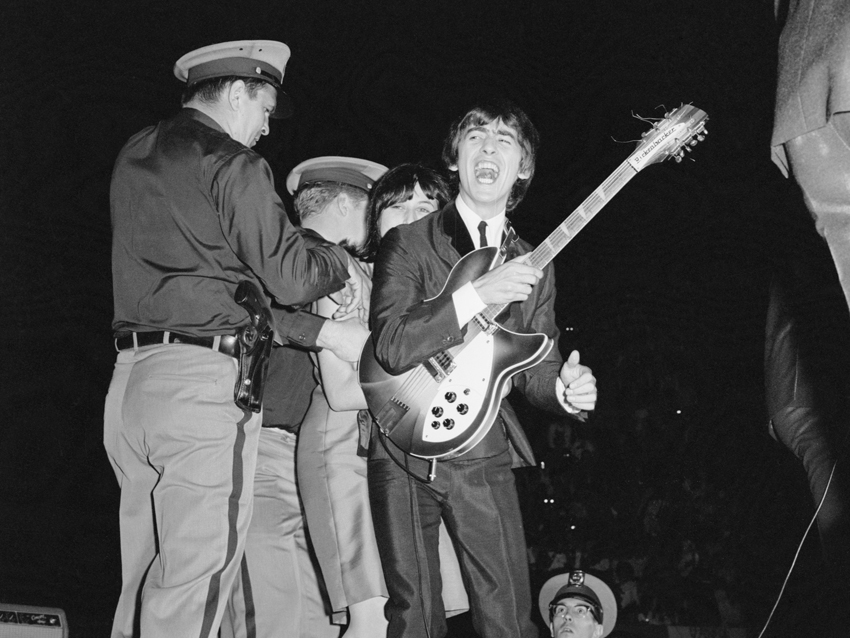
Producers Kevin Howlett, Mike Heatley on the new Beatles Live At The BBC set
The Beatles quit performing live for a number of reasons, but one of them was because they felt as though their musicianship started to suffer – because they just couldn’t hear themselves from all the screaming. Do you think they viewed the BBC sessions as a refuge from all the hysteria? They could go somewhere sane and actually play?
Howlett: “I’ve always felt that, and I did put that put to Paul earlier this year. And he said, ‘Yeah, that’s right.’ Especially towards the end of 1963, the audiences were completely wild and noisy, and whenever the band came into Abbey Road, it was a refuge from all of that. Of course, when they were in the studio, there was the pressure of making a record, which was going to be around, although they had no idea it’d be around 50 years later and would be listened to over and over and over.
“But they viewed the BBC sessions in a different way: They could be a bit more relaxed; it was a live performance, but they weren’t making something that was going to be pressed into plastic. So they experimented more and tried out a lot of songs. If you look at Pop Go The Beatles, there were a lot of songs that they just did once. Songs like I Just Don’t Understand that was on the first BBC album – that may well be the only time they played it together. It was never in their live act, but for that particular program, they wanted to try it.
“The interesting statistic for Pop Go The Beatles is that, by the end of the series in September, 1963, 18 songs had been released on their records, yet they did 56 different songs on that series. They really delved into their repertoire and experimented and tried out some current favorites.”
It’s amazing how prolific they were, especially when you consider how many things were going on around them during that time.
Howlett: “Yeah, well, bands nowadays don’t play cover tunes that much, do they? It’s a different thing. In some ways, The Beatles were the group that introduced the idea of writing your own material and being self-contained, but I would say that most groups aren’t as good at songwriting as they were. Perhaps they should do covers or have other people write their material for them. [Laughs] But The Beatles ended up with not just two, but three brilliant songwriters, so they could be self-contained.
“You know, there’s such an edge to their performances on these recordings. As Paul McCartney says, they were playing ‘like their lives depended on it.’ They were in the moment, and when the light went on, they went for it. And they were really, really great.”
Joe is a freelance journalist who has, over the past few decades, interviewed hundreds of guitarists for Guitar World, Guitar Player, MusicRadar and Classic Rock. He is also a former editor of Guitar World, contributing writer for Guitar Aficionado and VP of A&R for Island Records. He’s an enthusiastic guitarist, but he’s nowhere near the likes of the people he interviews. Surprisingly, his skills are more suited to the drums. If you need a drummer for your Beatles tribute band, look him up.
